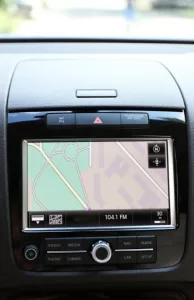
In our previous blog post of the “Understanding Search Warrants” series, residential search warrants, we covered tips for writing search warrants for single-family and multi-family residences, outbuildings, and commercial properties. Today, we discuss the crime scene on the go; writing vehicle search warrants.
When writing search warrants for vehicles, you can identify them by their license number and a brief description. If the license number is unknown or there are no plates on the vehicle, you may use its VIN number or location along with a detailed description. A warrant may authorize a search of ‘all vehicles’ on the premises, but only when there’s probable cause to believe that some listed evidence will be found in each vehicle. This post covers three topics: vehicles on a premises, vehicles in public, and motorhomes.
KEY TERMS TO KNOW:
Particularity: The term “particularity” refers to the constitutional requirement that a search warrant must clearly describe:
- The places and things to be searched.
- The items or records that can be seized.
Warrantless Search: A warrantless search exception is a circumstance under which law enforcement officers can conduct a search without a warrant, even though a warrant would ordinarily be required. These exceptions are permitted due to the realities of certain situations where obtaining a warrant may be impractical or unnecessary.
Premises: A premises often refers to a piece of property along with the buildings and other structures on that property. The term can encompass homes, businesses, land, or any other type of real estate. In the context of a search warrant, the “premises” would be the specific location or locations that law enforcement has permission to search. This could include a house and its curtilage, a business establishment, or any other designated area.
Vehicles, whether they are cars, trucks, or motorcycles, often play a key role in criminal investigations. They might be locations where evidence is discovered or even be the evidence themselves. Although the Fourth Amendment safeguards us from unfair searches and seizures, there are certain circumstances that allow law enforcement to search a vehicle. This can be done either with a search warrant or through exceptions that don’t require a warrant. Let’s explore these situations more closely.
Searching Vehicles at Residences: The Role of Search Warrants
In criminal investigations, a vehicle parked at a home can become a focal point if there’s good reason to believe it has evidence inside. This could include things like drug-related items, stolen property, or even a weapon used in a crime. To search the vehicle and retrieve these items, a search warrant is required.
If the vehicle is in a garage or driveway, and the police want to search it, the warrant must specifically include details like the make, model, color, and license plate number if known.
When requesting a warrant, officers must demonstrate probable cause with facts or evidence. They need to show that a crime has occurred, and the vehicle contains evidence of that crime. Simply relying on the general term “premises” won’t work, as this refers to buildings, not movable vehicles.
Sometimes, the police might not know which exact vehicles will be at a residence when the warrant is executed. In these cases, a “catch-all” clause is often added. It might say something like, “The search will also include all vehicles nearby that can be connected to the property through paperwork, registration, keys, or verbal ownership claims by those present.” This language meets legal requirements because it narrows the search to vehicles directly related to the property or claimed by those at the location.
The vehicle’s physical location and condition often influence whether a warrant is needed. Is it on a road? Is it occupied? Is it parked in a public or private lot? If in doubt, always consider getting a warrant.
For example, in United States v. Banks (7th Cir. 2023), the court ruled against the evidence because the officers could have gotten a warrant but didn’t. The suppression testimony in this case underscored that a judge is available 24/7 to issue search warrants. In this instance, the officers had ample reason to call the on-duty judge and get the necessary authorization. Their failure to do so meant they violated the Fourth Amendment when they stepped onto Banks’s porch without a warrant.
Vehicle Searches: Warrantless Exceptions
While search warrants are usually required, there are certain circumstances in which law enforcement can search a vehicle without one. These are called warrantless search exceptions and are based on legal precedents and established guidelines. Here are the most common ones:
Consent: If the vehicle’s owner or someone with authority over the vehicle voluntarily agrees to the search, a warrant isn’t needed. It’s crucial to remember that this consent must be freely given, not coerced.
Plain View: If an officer can see evidence of a crime from outside the vehicle, they can search the vehicle without a warrant. For example, if an officer notices a stolen item on the car seat while walking past, they can conduct a search.
Search Incident to Arrest: If a person associated with the vehicle is arrested, the vehicle can be searched without a warrant for officer safety or to prevent the destruction of evidence. This search, however, is limited to areas within the arrestee’s immediate control.
Exigent Circumstances: If there’s a risk that the vehicle could be moved or evidence inside it could be destroyed before a warrant can be obtained, an officer can conduct a search without a warrant.
Automobile Exception: Due to the mobile nature of vehicles, the law permits their search without a warrant if there’s probable cause to believe they contain evidence of a crime. This exception is based on the idea that the vehicle could be quickly moved out of the local jurisdiction.
The Unique Case of Motorhomes: When are Search Warrants Needed?
Motorhomes, also known as recreational vehicles (RVs), create special challenges when it comes to search warrants. Since they can function as both vehicles and homes, the rules for searching them can be quite complicated.
Here’s a general guideline:
- If the Motorhome Is Being Used as a Vehicle: Say it’s being driven on the road or is ready to be driven. In this case, it might fall under the “automobile exception.” If there’s good reason to believe it has evidence of a crime inside, the police can typically search it without a warrant due to the Vehicle Exception mentioned before.
- If the Motorhome Is Being Used as a Residence: Imagine it’s parked at a campsite and hooked up to utilities. Here, it’s more like a house, and the privacy expectations are higher. Generally, a search warrant is required. This must detail what parts of the motorhome will be searched and what items are being looked for.
However, keep in mind that exceptions like consent, plain view, and urgent circumstances still apply. If one of these situations is present, the motorhome might be searched without a warrant, even if it’s serving as a residence at the time.
So, the key factor in determining whether a search warrant is needed for a motorhome is how it’s being used at that moment. This unique scenario highlights the need to recognize the various situations where search warrants might be needed. Law enforcement officers must navigate these complexities with caution to ensure that searches are performed legally and with respect for privacy rights.
Vehicle Infotainment Warrants
A vehicle’s infotainment system is more than just a dashboard screen that controls the radio, GPS, or temperature in a car, truck, or SUV. It’s essentially a computer within the vehicle, and it can do much more than you might think.
This system remembers your driving patterns, including locations visited, phone calls made from the car, and even your driving speed. It can record various activities within the vehicle, such as seatbelt usage, doors opening and closing, and abrupt accelerations or braking.
What makes this data particularly intriguing is its emerging role in criminal investigations. Searching the infotainment system presents a unique challenge for search warrants. The location to be examined is the vehicle itself, and the items to be seized are the data within the system. It’s akin to a forensic examination of a mobile phone warrant.
By accessing this information, law enforcement agencies can piece together evidence related to a person’s movements, behavior, and connections. The infotainment system thus becomes a significant tool in modern criminal investigations, adding a new dimension to the legal considerations around search and seizure.

Want to learn more about search warrants? Follow our blog series to learn more about how search warrants work, tips & tricks for writing great warrants, and insights on evidence that law enforcement can collect. There is a lot to learn, so rely on the experts at WarrantBuilder.com! Sign up for a free trial and learn why cops across the country trust Warrant Builder for fast, efficient, and complete search warrants.
